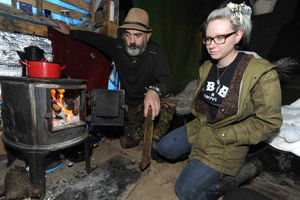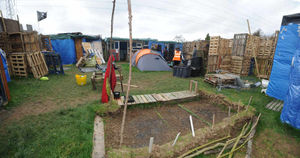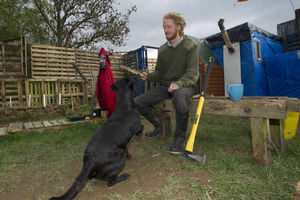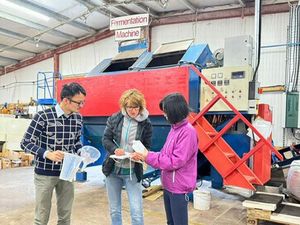Anti-drilling campaigners get ready for winter at Shropshire camp
The winter weather is starting to bite, but at Shropshire's anti-drilling camp the 'protectors of the land' are prepared to sit out whatever the elements throw at them.
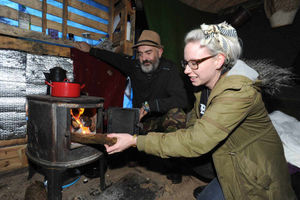
For some of those who are living at 'Castle Dudleston' a makeshift camp on the site of a planned exploratory drill site for a company wanting to extract coal bed methane, it will be the second winter they have spent living an outdoor life in their campaign against unconventional gas extraction.
Half a dozen 'protectors' as they like to be called, moved onto the site on Brooklands Farm ,at Dudleston, near Ellesmere, at the end of the summer.
Over the weeks a wooden castle, built from pallets, corrugated metal and waterproof tarpaulins have replaced their tents and a remarkable amount of furniture, from sofas to log burning stoves, has been carried across fields to make their home as cosy as possible.
Supporters have been donating items, from old sleeping bags and quilts to food, from batteries to wood for log burners and their have been called for old car batteries and wind up radios and torches and even solar panels as the camp has no power.
The protectors are now sitting out the time until the next Shropshire Council meeting on December 16 when councillors will decide whether to rubber stamp their recent in principle decision to overturn planning officers' guidance and refuse permission for the exploratory drilling.
One of the residents, known only as 'Yellow Belly' said: "The weather is not a problem the castle is holding well - even against the recent winds.
"For us this is the second winter we endeavour to fight on to protect the land and its fauna and flora. Unconventional extraction has no place at sea or land."
He and the other protectors said they had been delighted by the in principle decision.
He said: "The decision by the council to object has installed much needed faith in humanity. We have so much admiration and respect for the eight councillors who voted against the industry. These are the people who care and who protect the people who have elected them."
The Castle Dudleston group has asked for meetings with local MP Owen Paterson and Prime Minister David Cameron. They are against any drilling on land and claim the exploratory drill site for coal bed methane could eventually lead to wider activity, including fracking.
"I suspect this will never come as they cannot guarantee that this industry is safe for all who live upon this planet," Yellow Belly said.
"The government says it has strict safety procedures in place. However when you have to use chemicals to stimulate the release of fossil fuels this can never be safe to all species on the planet.
"Many people may say that environmental groups like ours are getting in the way of energy production but we as a country are best placed more so than any other in the northern hemisphere to produce renewable energy given our global position. The industry promotes job growth and cheaper energy prices for the people of the UK and the planet.
"However with shale oil we have noticed a decline on the price per barrel only achieving 75 dollars per each unit when they need to make at least 100 for profit."
The Government says it is committed to supporting activity such as methane extraction and fracking.
The chemicals giant Ineos announced this week it is to announce a plan to invest up to £640m in shale gas exploration in the UK. The company, which runs a huge refinery and petrochemicals plant at Grangemouth, on the Firth of Forth, recently acquired 729 sq miles of fracking exploration licences in central Scotland.
The move would make Ineos one of the largest shale gas players in the UK and will be welcomed by government ministers who are seeking to speed up exploration. Ministers say they see fracking as an opportunity to develop a new domestic energy source as fields in the North Sea decline. Shale gas and oil have transformed the US energy market, although experts say the idea that it will lower energy prices in the UK is "baseless economics".

